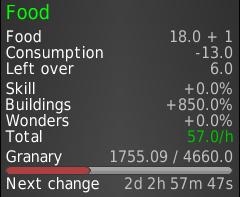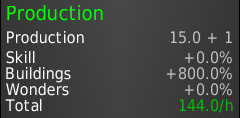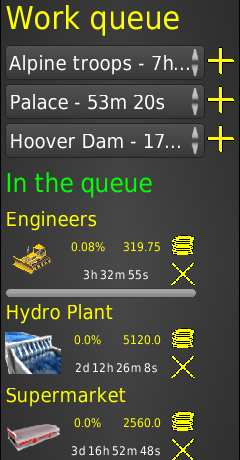6. Economy
Economy
The resources which your cities extract from the surrounding terrain are the fountain from which your civilization is watered. Here each of the three resources is described along with its properties, uses, and limitations.
Food
Your population needs food to survive. Every city generates at least one production point per hour and every city has a granary for storing food points (the building called a Granary only enhances this capability). Cities producing more food than they require accumulate the excess in their granary, while those producing less than they require deplete their granary. When food is needed but none remains, the city population starves, killing one citizen, until the food deficit ends.
Excess food can increase the population: the city granary has a limited capacity, and when it reaches full the city grows by one citizen and the granary starts again at empty. But since granary capacity increases with population, each citizen is more costly than the last, making this mode of growth important only for small cities. You can increase the food income of the city by skill, buildings and wonders.

Food in the city
Production
Every city generates at least one production point per hour, the points are applied towards whichever unit, building, or wonder has been selected as the city's current product. Production points accumulate until the cost of the product has been achieved. Products appear in their city when complete — units appear on the map while buildings and wonders are added to their city's list of structures. Any leftover production points are lost.

Production of the city
Each player is free to build any products that his technology has made available, with a few restrictions: each city can have only one of each building; and each city can have only one wonder. Be careful — the game even gives you the freedom to produce units you cannot support and buildings whose upkeep you cannot afford, both of which will be disbanded immediately after completion.
You can always change the product on which a city is not working and you can spend gold to complete a project by hitting the buy button on the work queue bar.
Should you need gold instead of production points, you can direct cities to mint coinage. Instead of producing a building or unit, the city will use its labor to produce one gold piece per turn for each production point it generates.
When a city completes a unit it normally starts producing another item from the queue. Often you will instruct the city to work on something else instead, but this wastes time and attention if you already know the next several items the city should produce. In this case you can access the work list for that city and specify several products at once; the city will produce them in the order specified without any further intervention.

Work queue of the city
If you develop series of products you often use but tire of entering them manually into every city's work list, the game allows you to define named work lists and add them to city work lists. You might for example define a "coastal" list of improvements for cities on the ocean, or a "science" list for cities whose research output you are maximizing.
Trade
Trade reflects wealth generated in each city by external commerce. Some trade points may be lost to corruption, which varies among forms of government and increases with distance from your capital city. Each city distributes its remaining trade points among three uses: gold, in the form of taxes, goes into your national treasury; luxury points influence worker morale; and science points contribute towards the discovery of new technology.
You must choose a single ratio for your city by which trade points are distributed among these three uses. Though you may alter this ratio on anytime turn and most forms of government limit their maximum value.

Trade of the city
Trade routes
Besides working terrain gifted with rare commodities, or with access to waterways and roads, you can increase trade by establishing trade routes between cities. You accomplish this by producing a caravan or freight, sending them to another city or belonging to a different (allied) civilization's city.
Also, an ongoing trade route is established that benefits both its origin and destination equally by generating trade points for each city, the amount of ongoing trade is based on:
- the average of the trade values of connecting cities
- is doubled if the cities are from different civilizations
- is doubled if the route is established by Freight unit
- is multiplied by the distance bonus: 3.5 - POW(3.5, 1/(1 + distance/100))
The number of trade routes per city is unlimited but every trade route lasts for 48 hours, providing trade points to the initiator city with the value calculated as above in every hour. The player who initiates the trade route gets six times the value of the trade route multiplied by the set percentage rates of science and tax of the initiator city (which will be added to the science points and the treasury, respectively).
(Content is available under the GNU General Public License).

